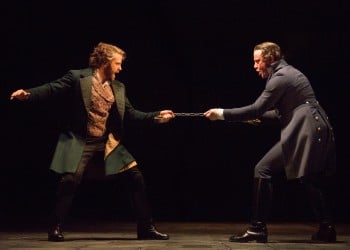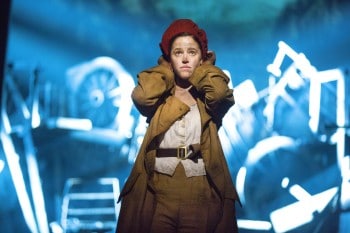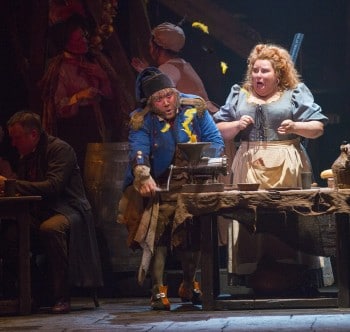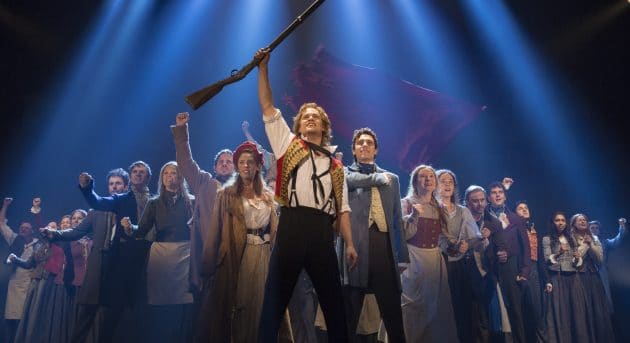Review: Les Misérables, Sydney season
It’s an epic musical, a towering behemoth from the 1980s – an era that spawned plenty of them, like Cats and Phantom of the Opera – but Les Misérables , a sung-through, all-feeling story of love, injustice, and striving for liberation and redemption in dark times, feels like the biggest of them all. In Sydney after successful seasons in Melbourne and Perth, the dream is being dreamed on stage at the Capitol Theatre in intense bursts of passion. It received a standing ovation on opening night.

In Laurence Connor and James Powell’s all-new staging, the set feels endless thanks to clever use of projections and animations. The night creeps in around Jean Valjean (Simon Gleeson), paroled after 19 years of hard labour and struggling to make a life with the baggage of his crimes weighing him down, and it creeps in as shadowy tunnels, bottomless water, always this dark beyond, the despair that backdrops the loss, joy, and struggle of all the characters on stage.
Valjean does build himself a new life, as a mayor even, peaceful and successful until of course his past catches up with him in the form of Inspector Javert (Hayden Tee), a hungry, dogged lawman who has clawed himself into respectability and unwilling to look beyond his narrow definition of what is right. When Valjean’s path crosses with the lovely, tragic Fantine (Patrice Tipoki), his conscience re-ignites and he pledges to take care of her daughter, Cosette (Emily Langridge).
And then of course Cosette grows up and falls in love with a well-bred student, Marius (Euan Doidge) who falls into a burgeoning revolution; of course Valjean can’t escape Javert or his past, of course Marius is beloved by the daughter of the twisted innkeepers that raised Cosette before Valjean took her into his care; of course the fanned flames of revolution catch, and a barricade is erected in town, and everyone must face themselves and their fears, either in war against France or against themselves.
It’s all sentiment and idealism and crusading, with a stirring, heart-tugging score that soars and whisks you away, and Les Misérables lives or dies on its score, and the cast’s relationship to it – how they sing it and act within it.

In this production, the score is rushed, with a too-fast tempo (by musical director and conductor Geoffrey Castles) that prods the actors into startling emotional shifts that don’t quite land, and creates a gently troubling sense of dissonance between the high stakes on stage and the audience’s capacity to truly care about those stakes.
Fantine’s short time on stage is fraught with horror, injustice, and tragedy, but this production is so rushed, we can’t stop for a beat or two and care for her and cry with her. And “One Day More”, the ensemble number that closes the first act, seems to get rousing in one beat and then end in the next.
The production keeps snatching away those moments of high emotion that makes Les Misérables transcend its harder to chew moments (a precariously-weighted book and a tendency towards the overwrought) and become something legendarily adored.
The cast is superb, though, and truly so. Gleeson is a remarkable Valjean, who carries the show as effortlessly as his character rescues a man from a runaway cart. His performance of “Bring Him Home” is pure as prayer.
The other side of his coin, Hayden Tee’s Javert, is astounding – he colours the show’s most villainous role with complex vulnerability and aggression, and his performance of Javert’s signature “Stars” is something close to enlightening – he does something new, and very welcome, with the stiff Javert of Les Mis’ past.
Kerrie Anne Greenland, as spirited, wilful Éponine, is outstanding, a star made on stage before our eyes. Her Éponine is headstrong and yearning and doesn’t sacrifice one for the other; when she sings “On My Own” she holds the audience in the palm her hands. She barrels into the last major note of the song with full power and it’s gorgeous; Éponine loves Marius, and Greenland brings it to such vivid life. The world full of happiness that she has never known has never felt so clear and so far away. She’s fantastic.

Doidge and Langridge as lovers Marius and Cosette are equally simple, safe, and pleasant; though Doidge’s part felt slightly beyond his vocal capability on opening night, he acquits himself well as a floundering romantic, charming particularly in “A Heart Full of Love.”
The ensemble creates some standout acting moments, small and backgrounded – but sometimes a much-needed stillness is sacrificed for character colour, and the stage is too crowded with events when an emotional moment could be left unadorned, particularly through the second act.
But a little crowding is worth it in one instance: for the largely wordless emotional through-line of Luke Joslin’s gruff, hard-drinking, cynical revolutionary student Grantaire, who becomes the unofficial protector of the cocky, heart-stealing, impish and fearless child Gavroche (played by four alternating actors during the run). This connection lands in the gut in the second act as tragedy hits, and it’s thanks to those two actors. It makes up for the rushed show and rushed tempo stepping on the poignancy of “Drink With Me,” which should go further to gift Grantaire and the other students with character development, when given room to breathe.
Chris Durling is a commanding Enjolras, a leading light on Act II’s barricades – and when the students fall it is capped by an affecting song for the boys who were “fighting for a new world that would rise up like the sun,” a world that never comes.
And it’s impossible to commend the cast without mentioning its glorious clowns: Lara Mulcahy and Trevor Ashley, serving comedy for the gods with their Thénardiers, the show’s blessed comic relief. Their double-act is sharp, refined, and intelligently slovenly; Ashley takes on a menacing edge later on, squaring off against his daughter, while Mulcahy’s expressions grew comically larger, reaching the dress circle loud and clear. It’s the kind of performance that becomes instantly beloved.

I am torn. The talent in the cast is beyond impressive, certainly the best of the best – has there ever been an ensemble that could create such divine harmonies? – and all the ingredients are there for something transcendent. But the rushed tempo throws off the show’s internal pacing, which restricts emotional connection with the plot, which restricts the emotional engagement with the songs – the songs, and story, that are being performed at a really high level.
Those already familiar with the story, show, and score will be able to sketch in that emotional connection for themselves, and may well experience that transcendence. So too might people who want a bit of a rush from the show, quick cuts and smash cuts of a sort, like a roller coaster or car chase or a summer blockbuster. This is going to be very right for a lot of people for a lot of real reasons. Which is so wonderful. And there was a lot I liked. But it is also hindering itself by refusing to build up to big moments, letting us really feel the payoff, and I wanted to be invested in those payoffs.
So much of this show is right but it seems to be going out of its way to stop you from caring too much. It needs to take a stop, breathe out, look around at its many gifts, breathe in, and continue.





I have seen Les Mis more than 350 times worlwide incIuding 8 times in Melbourne, so I did enjoy your review. Your comment about it being rushed is very true and that combined with the excessive spoken and shouted words spoilt it for me completely. With respect, I did not agree with your review of Eponine. In my opinion, she sang On My Own in a way that contradicted the essence of the book. Powerful as the last note was, it should not be screeched to convey her message. I believe she has misinterpreted her part of the story. Javert was the absolute star of this show, for me.